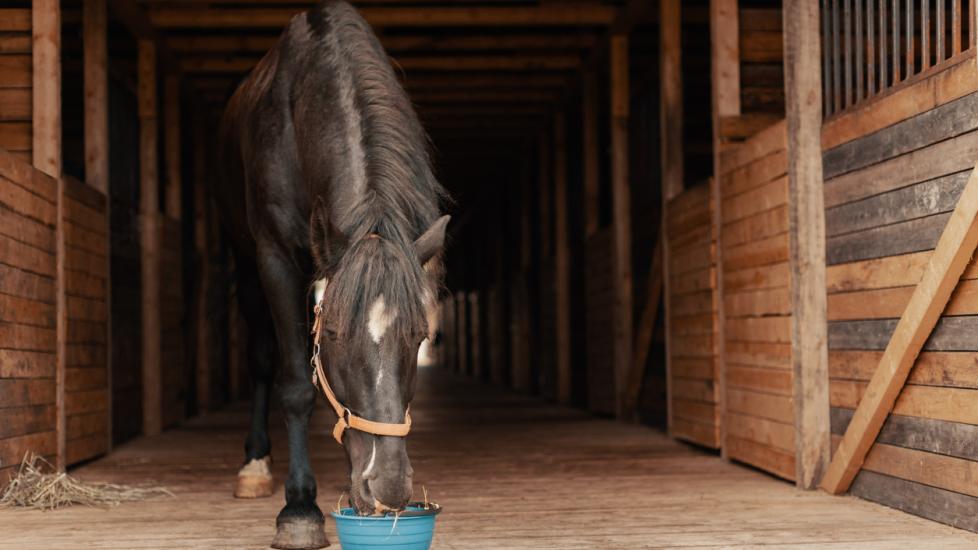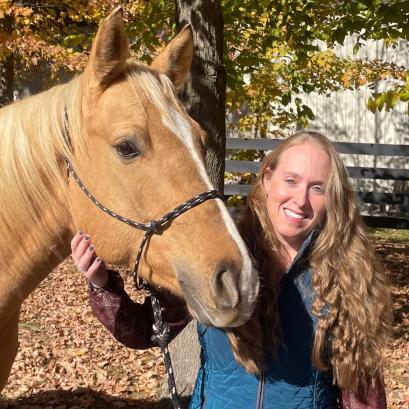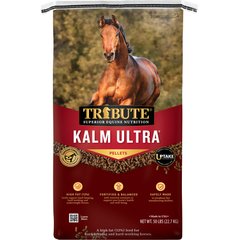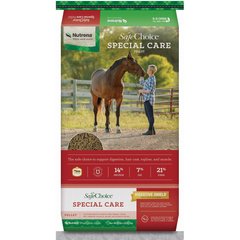Horse Feeding: Everything You Need to Know
iStock/Irina Orlova
Adequate nutrition is an essential part of maintaining a happy, healthy horse. Unfortunately, there is no “one size fits all” plan.
While the nutritional needs of each horse depends on their individual lifestyle, the foundation of every horse's diet should consist of forage (plants). And some horses may need an additional pelleted grain/feed or supplements to help with any deficiencies.
Key Takeaways
- The foundation of every horse's diet should be forage (grass or hay), with additional feed or supplements for specific needs, such as deficiencies or high-energy demands.
- Horses have a small stomach and require multiple meals daily to prevent digestive issues like ulcers.
- Horses need carbohydrates (main energy source), fats (concentrated energy), proteins (amino acids for body maintenance), minerals, vitamins, and water for overall health.
- Common feed options include hay, pasture, concentrates (grains like oats), and commercial complete feeds. Supplements should only be added if necessary, based on specific dietary needs.
Understanding The Equine Digestive System
It takes 45-72 hours for food to completely pass through the horse's digestive tract. The digestive tract is made up of two sections: the foregut and hindgut.
The foregut is made up of the stomach and small intestines. Its primary job is to digest and absorb most starches, protein, fat, vitamins, and minerals in food. The hindgut is made up of the cecum, large colon, small colon, and rectum. This section of the digestive tract contains microbes, bacteria, and protozoa, that help digest dietary fiber from the roughage (hard to digest vegetable material) within a horse's diet.
Horse stomachs are relatively small compared to their body weight and can only hold a small amount at one time. Their stomachs have a glandular and nonglandular area. Unlike humans who only produce gastric acid when actively digesting food, horses produce gastric acid constantly because they are meant to be grazing in pastures daily.
It’s critical to feed horses at least twice a day on a regular schedule. Many horses benefit from being fed 3 or more feedings spread out throughout the day. This is better for their digestive tract and can help prevent gastric/stomach ulcers from forming.
In general, horses should eat 1-2% of their body weight in forage. For example, a 1,000-pound horse should eat between 10-20 pounds of forage per day.
If you must change or introduce anything new to your horse's diet, gradually introduce the new food over 5-7 days. This is to help prevent any type of digestive upset such as diarrhea, colic, or laminitis.
Required Nutrients for Horses
Nutrients can be divided into six different categories:
- Carbohydrates
Carbohydrates are an important nutrient that serves as a main energy source for all animals, including horses. Carbohydrates can be categorized by Structural and Non-structural carbohydrates (NSC). Cellulose is an example of a carbohydrate that is found in hay and grass. Some horses may need to be limited in the amount of NSCs (such as starch or sugar) in their diet due to endocrine or muscular disorders like Polysaccharide Storage Myopathy (PSSM) or Cushing’s disease.
- Fats
Fats or oils are also used as an energy source for horses. The amount of energy provided by fat is more concentrated than energy in carbohydrates. Because fats are 2.25 times more energy per gram compared to carbohydrates, it is important to never feed more than 10% of a horse’s diet in fats or oils. Fats can be used as an energy source for horses that may not tolerate NSCs well.
- Proteins
Though many bags of feed will list protein, the actual dietary requirement is amino acids. During the digestive process, proteins are broken down into amino acids. Amino acids enter the blood stream from the intestines and are carried to all parts of the body. Amino acids will eventually become muscle, internal organs, bone, blood, skin, hair, hooves, and many other parts of the horse. Any amino acid that is not used to maintain or build a horse's body is converted into energy or passed through the digestive tract.
- Minerals
Minerals are inorganic compounds (lacks carbon-hydrogen bonds) that are essential in small amounts. Iron, copper, phosphorus, calcium, and magnesium are common examples of minerals that are important for maintaining a horse's body. Iron is important for carrying oxygen in blood cells to the body, while calcium and phosphorus are important for the formation and maintenance of bone and teeth.
- Vitamins
Vitamins are only needed in small amounts but are still vital to a horse’s health. Many horses will get an adequate number of vitamins when they are allowed to graze on grass, but if this is not the case, then it may be important to provide a vitamin supplement.
- Water
Water makes up about 70-75% of the body and supports metabolism and body temperature control. A horse will drink between 10-15 gallons of water per day depending on their size, environment, and lifestyle.
Types of Horse Feeds
Your horse's essential daily nutrition can come from a variety of feed sources. Often, horses are provided a combination of the following feed sources in order to maintain a healthy horse.
Hay
Hay is a type of forage and should make up most of a horse's diet. Hay can consist of grass including orchard grass or can be from a legume (crop) such as alfalfa. Alfalfa hay is generally best for horses in high work environments or lactating mares where the calorie and energy need required is high. Grass hay is great for easy keepers or horses in light work. Most of the nutrients in hay comes from the leaves and is a valuable source of nutrients.
Pasture
Pasture can be a great source of forage for horses. A well-managed pasture can provide reduced feed costs as well as the energy, protein, vitamin, and mineral needs for the horse. It is important that a pasture isn’t too lush or too long so it’s an ideal place for grazing. Good pasture grazing can also provide horses with great daily exercise.
Concentrates
Small grains such as corn, oats and barley are considered concentrates. These are generally lower in fiber and higher in energy compared to pasture or hay.
Grain quality is just as important as hay/pasture quality. Oats tend to be the safest and easiest grain to feed with hay because it is high in fiber, low in energy, and higher in protein when compared to corn for example. Feeding too much of these concentrations can cause inflammation of the intestines and excessive reflux, leading to colic. All grains tend to be low in calcium and high in phosphorus.
Supplements
Supplements make up a large part of the equine diet industry today, but you should only add supplements to your horse’s diet if something is missing.
Keep in mind, grains are considered energy supplementation to a high forage diet. You should only add supplements to your horse's diet if there is something missing. Discuss with your veterinarian before adding anything new to your horse's diet including supplements.
Commercial grain / complete feed
Commercial grain is a mixture of grains and supplements added to increase the nutrient content in the mixture. Compete feed is a grain mix that is high in fiber. These can be specific to the age or lifestyle of the horse. Complete feed diets can be convenient, easy to use, and are properly formulated to provide a horse with the required nutrition.
Horse Daily Feeding Chart (for the average 1000-pound adult horse)

Horse Feeding Schedules
No matter the lifestyle or age of your horse, their feeding schedule should remain consistent. Always remember to feed grain meals in small amounts, and it is always better to feed multiple meals throughout the day instead of one or two big meals.
Free choice hay or pasture grazing is ideal for the horse's digestive tract. When adding or changing anything in your horse's diet, always gradually transition over 5-7 days to prevent the risk of colic, laminitis, diarrhea, or other digestive upsets. If you have any concerns with your horse's diet or nutritional needs, it is always best to discuss with your primary vet or an equine nutritionist.
Horse Feeding Tips
When determining what nutritional needs your horse may have, you can start with body condition scoring your horse to analyze his current condition. Always remember that most of a horse's diet should consist of forage (hay or pasture). Grains or supplements should only be added depending on age and lifestyle, and in partnership with your veterinarian.
In general, most horses are not picky eaters but if you find that your horse does not want to eat or is acting unusual around food, reach out to your veterinarian to make sure there are no issues with his mouth or digestive tract.
When feeding your horse, always watch for any mold, dead animal carcasses, or foul-smelling feed. If you suspect any of these, do not feed the hay or grain to your horse. Just like in people, these can cause horses to become sick and can even be fatal in some instances.
References
-
AAEP. Nutrition: The Key to Unlocking Your Horse’s Health | AAEP. 2016.
-
Penn State Extension. Feeding Horses. 2015.



